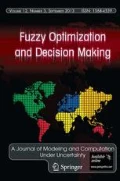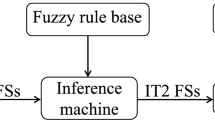Abstract
It is well-known that Markov inequality, Chebyshev inequality, Hölder's inequality, and Minkowski inequality are important and useful results in probability theory. This paper presents the analogous inequalities in fuzzy set theory and rough set theory. In addition, sequence convergence plays an extremely important role in the fundamental theory of mathematics. This paper presents four types of convergence concept of fuzzy/rough sequence: convergence almost surely, convergence in credibility/trust, convergence in mean, and convergence in distribution. Some mathematical properties of those new convergence concepts are also given.
Similar content being viewed by others
References
Ash, R. B. (1972). Real Analysis and Probability. New York: Academic Press.
Dubois, D. and H. Prade. (1988). Possibility Theory. New York: Plenum.
Laha, R. G. and V. K. Rohatgi. (1979). Probability Theory. New York: Wiley.
Liu, B. (2002). Theory and Practice of Uncertain Programming. Heidelberg: Physica-Verlag.
Liu, B. and Y.-K. Liu. (2002). “Expected Value of Fuzzy Variable and Fuzzy Expected Value Models,” IEEE Transactions on Fuzzy Systems 10(4), 445–450.
Liu, Y.-K. and B. Liu. (2002). “Expected Value Operator of Random Fuzzy Variable and Random Fuzzy Expected Value Models,” International Journal of Uncertainty, Fuzziness & Knowledge-Based Systems, to be published.
Pawlak, Z. (1982). “Rough Sets,” International Journal of Information and Computer Sciences 11(5), 341–356.
Pawlak, Z. (1985). “Rough Sets and Fuzzy Sets,” Fuzzy Sets and Systems 17, 99–102.
Pawlak, Z. (1991). Rough Sets: Theoretical Aspects of Reasoning about Data. Dordrecht: Kluwer Academic Publishers.
Slowinski, R. and D. Vanderpooten. (2000). “A Generalized Definition of Rough Approximations Based on Similarity,” IEEE Transactions on Knowledge and Data Engineering 12(2), 331–336.
Wang, Z. and G. J. Klir. (1982). Fuzzy Measure Theory. New York: Plenum Press.
Zadeh, L. A. (1978). “Fuzzy Sets as a Basis for a Theory of Possibility,” Fuzzy Sets and Systems 1, 3–28.
Author information
Authors and Affiliations
Rights and permissions
About this article
Cite this article
Liu, B. Inequalities and Convergence Concepts of Fuzzy and Rough Variables. Fuzzy Optimization and Decision Making 2, 87–100 (2003). https://doi.org/10.1023/A:1023491000011
Issue Date:
DOI: https://doi.org/10.1023/A:1023491000011



